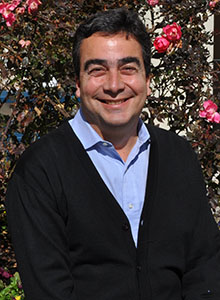Fernandes Shares Expertise in Urban Planning
 Edesio Fernandes, a Brazilian lawyer and city planner based in London, is a guest lecturer in foreign enrichment course, International Perspectives on Urban Law and Policy, which draws graduate students from across the university to learn about environmental, land use and growth management issues in other countries.
Edesio Fernandes, a Brazilian lawyer and city planner based in London, is a guest lecturer in foreign enrichment course, International Perspectives on Urban Law and Policy, which draws graduate students from across the university to learn about environmental, land use and growth management issues in other countries.
Fernandes is providing students with a general conceptual framework of international urban development, helping them understand from a social and legal viewpoint what are the questions and challenges facing developing countries.
"Today, you can't discuss law without discussing management of the political and institutional systems that are in place," he says. "Change can only happen through intergovernmental participation and participation by citizens."
His goal is to show students how legal and planning systems have created unsustainable developments that lead to segregation, exclusion, informal settlements, inefficiencies and environmental impacts; and how a redefined system could promote urban reform. He also addresses the balance between individual rights and collective social, cultural and environmental rights.
Fernandes, a member of London's DPU Associates, also is on the teaching faculty of the Lincoln Institute of Land Policy and coordinates International Research Group on Law and Urban Space, a partner of United Nations/HABITAT. His research and teaching interests include urban and environmental law, planning and policy, local government and city management, and constitutional law and human rights in developing countries.
He has taught in Georgia State University College of Law's summer study abroad program, Law and International Development, in Rio de Janeiro, Brazil, for the past three years. During his first trip to Atlanta, Fernandes has made many observations about the city and how it compares to other international cities.
"I am impressed by the greenbelt in Atlanta, but surprised by the urban sprawl," he says. "Atlanta is different than other major metropolitan areas around the world that I have worked in because the sprawl is opposite.
"Elsewhere in the world you find most people living inside the city limits; however, in metro Atlanta most of the population lives outside the city proper," Fernandes says. "This is a costly model for the future, with respect to infrastructure. However, I think downtown Atlanta and Georgia State University are doing a lot to change this and bring more people into the city center. This will be a good thing for the future."
Fernandes on Urban Issues in the Political and Social Context
• Noon-1 p.m. Wednesday, Feb. 27, Urban Life Building Room 675
• Lunch provided. R.S.V.P. by Monday, Feb. 25, to Karen Johnston (J.D. '08)
Learn more »